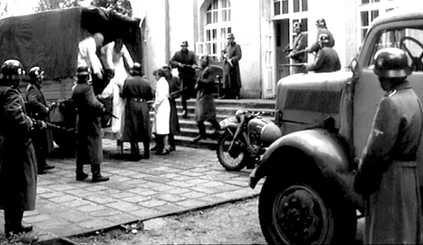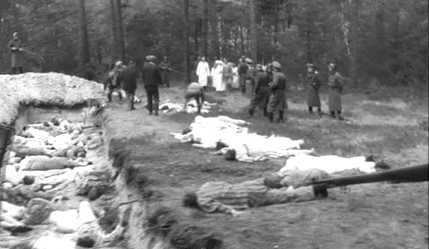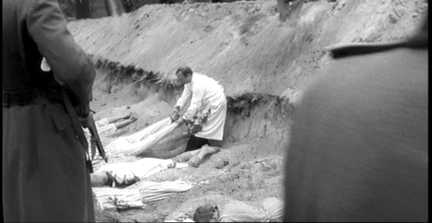Author of the first novel based on the medical mass murder
In
March 27, 2006, Stanislaw Lem died at the age of 84.
He was probably the most famous Polish writer of the 20th century. We,
as individuals who became acquainted with the terror of psychiatry,
have a special interest in this writer as he, to my knowledge, is the
only one who literarily processed in a novel the systematic murders
in psychiatric institutions from 1939 to 1948 which are still varnished
over in Germany and in the whole world the with the Nazi euphemism "Euthanasia".
According to Stanislaw Lem he wrote his first novel in 1948.
3 photos below: Scenes from the Polish filming of Lem's book "Hospital of the transfiguration" directed by Edward Zebrowski.
 The
title of the book is "Hospital
Of The Transfiguration". But Lem could not publish the
novel because of the Polish/communist censorship, instead for years
he had to rewrite and supplement the text. Only in 1955 under loosened
censorship regulations was the work published in Poland. It appeared
in 1959 in East Germany for the first time in German and was brought
out as a paperback again in 1982 and 1998 by the Suhrkamp publishing
house. In this book a young physician named Stefan held his first position
in psychiatry and quite soon he already becomes conscious of the special
atmosphere at this place. He observes this strange environment with
confusion and has more and more the feeling that he also carries responsibility
for this. The onset of the brutality by SS troops, who occupied the
hospital and liquidated inmates, resulted in the collapse of any façade
of conventionality that existed between his colleagues.
The
title of the book is "Hospital
Of The Transfiguration". But Lem could not publish the
novel because of the Polish/communist censorship, instead for years
he had to rewrite and supplement the text. Only in 1955 under loosened
censorship regulations was the work published in Poland. It appeared
in 1959 in East Germany for the first time in German and was brought
out as a paperback again in 1982 and 1998 by the Suhrkamp publishing
house. In this book a young physician named Stefan held his first position
in psychiatry and quite soon he already becomes conscious of the special
atmosphere at this place. He observes this strange environment with
confusion and has more and more the feeling that he also carries responsibility
for this. The onset of the brutality by SS troops, who occupied the
hospital and liquidated inmates, resulted in the collapse of any façade
of conventionality that existed between his colleagues.
In the obituaries on Stanislav Lem this work is often suppressed, although in our opinion it is the important key to Lems life's work, since in Lem’s own words „it contained my personal experience from the time of the war and the occupation, however not auto-biographic elements, but rather only the attempt to lend expression to my relationship to the perceived world at that time."
When Poland was occupied by Germany, as a persecuted Jew, Lem was able to survive with false papers as car mechanic and he belonged to the Polish resistance. His father was a ear, nose and throat physician and Lem, with two interruptions, studied medicine. He also received the certificate for full completion of his studies but he refused the last exam for the doctorate in order to escape a career as an army surgeon. After this Lem no longer wanted to work as a physician.
 Thereafter
Stanislaw Lem became known to an international public through his science
fiction novels. The two filmings of "Solaris" played a special
role here, even though he regarded both as a failure. Due to the fact
that he did not represent technical fantasies affirmatively as utopias
but rather dark social projections of the future, he – just like
Philip K. Dick – for the first time developed literary quality
in the category of science fiction. Also Philip K. Dick used psychiatry
and psychiatric methods as an allegory for dark social distopia under
the guise of science fiction. Thus the Süddeutsche newspaper writes
in his obituary:
Thereafter
Stanislaw Lem became known to an international public through his science
fiction novels. The two filmings of "Solaris" played a special
role here, even though he regarded both as a failure. Due to the fact
that he did not represent technical fantasies affirmatively as utopias
but rather dark social projections of the future, he – just like
Philip K. Dick – for the first time developed literary quality
in the category of science fiction. Also Philip K. Dick used psychiatry
and psychiatric methods as an allegory for dark social distopia under
the guise of science fiction. Thus the Süddeutsche newspaper writes
in his obituary:
Lem had founded scientific knowledge, which he linked in his novels
and narrations impressively with philosophical and moral problem definitions
to a time-critical utopia.
An initial fascination with technology yielded ever more to a pessimism
of sceptical mankind. He achieved world fame however as a master of
respectable and intelligent science fiction literature, in which he
described the impact of technology on the intellectual world.
Author
Marcus Hammerschmitt had a similar success with literary science fiction
novels. In his obituary of Stanislaw Lem he wrote in the Swiss newspaper
"Sonntagsblick“:
But what was it exactly that electrified me in such a way? Today
I would say: Lem’ s boldness: the courage with which he applied
vision, poetry and literary accuracy to a little attractive, epigonalen
and sometimes sterile literature form.
The way in which he just went there and said: I will show you that certain experiences and constellations of our age are only negotiatable in the context of science fiction and nowhere else. I will show you how in literature something absolutely foreign can be named and conjured, without having to resort to cheap costume and theatrical tricks. I describe how it is for humans in a world which is not made for them, whose path we sometimes cross in most unclear and deeply disturbing ways, but of whom cannot be said whether they will tolerate us in the long term.
 That
Lem possessed the temerity to say all this in a repressive societal
system which was then nevertheless flexible and reasonable enough to
allow him freedom in this regard, I only later learned to appreciate.
And this was Lem’s life agenda: under restricting circumstances
to find and translate into literature for his readership the modern
trend in all its frightening facets whether this readership knew how
to appreciate this or not.
That
Lem possessed the temerity to say all this in a repressive societal
system which was then nevertheless flexible and reasonable enough to
allow him freedom in this regard, I only later learned to appreciate.
And this was Lem’s life agenda: under restricting circumstances
to find and translate into literature for his readership the modern
trend in all its frightening facets whether this readership knew how
to appreciate this or not.
This
life agenda had, logically, as it were, its origins in the knowledge
of systematic medical mass murder. The utopia of the modern trend, the
medical utopia of the healthy body and - still much more importantly
– the therein allegedly healthy, because reasonable, spirit is
actually a utopia, whose political dimension the physician Nazis with
their phantasy of a healthy people’s body („Volkskoerper“)
murderously carried out.
The knowledge of this horror, which he worked into his first novel,
enabled Lem to see and describe the abyss of modern fiction behind technical/scientific
fantasies developed perhaps with good intentions.